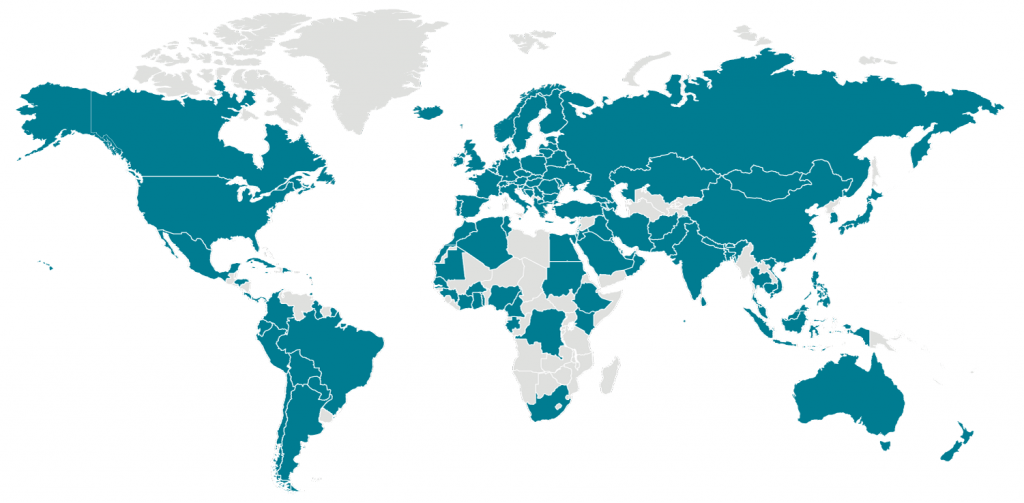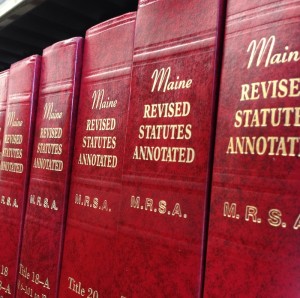Maine Federal Court orders have announced partial closure and postponement of most civil and criminal cases amid concerns regarding COVID-19. Maine’s State Courts have also postponed most cases. The initial Federal Court order was limited and postponed only matters involving juries. A second order has since superseded the first and effects a more comprehensive delay of almost all civil and criminal case proceedings.
Federal Court’s March 13, 2020 COVID-19 order
The Maine Federal Court first issued a COVID-19 related order on March 13, 2020. This order delayed some criminal cases through April 30, 2020 and provided as follows:
- All civil and criminal (grand and petit) jury selections and jury trials scheduled to commence before any district or magistrate judge in the District of Maine are hereby CONTINUED pending further Order of the Court;
- All grand jury proceedings in the District of Maine are hereby CONTINUED pending further Order of the Court. Due to the unavailability of a grand jury in this District during the pendency of this General Order, the 30-day time period for filing an indictment is tolled as to each defendant until this General Order terminates. See 18 U.S.C. § 3161(b);
- The Court finds that the ends of justice served by ordering the continuance of all criminal jury trials outweighs each defendant’s right to and the public’s interest in speedy indictment or trial. Therefore, the time period of the continuances implemented by this General Order will be excluded under the Speedy Trial Act, 18 U.S.C. § 3161(h)(7)(A), subject to the entry of an order addressing the same by the presiding judge in each case. Individual judges presiding over criminal proceedings may take such actions consistent with this General Order as may be lawful and appropriate to ensure the fairness of the proceedings and preserve the rights of the parties, particularly where defendants are detained pending trial;
- This General Order does not address or limit the scheduling of non-jury criminal and civil trials, hearings, and events in the District of Maine;
- The Edward T. Gignoux U.S. Courthouse in Portland and the Margaret Chase Smith U.S. Courthouse in Bangor will remain open for all other business. The public is encouraged to continue utilizing Court services while following applicable public health guidelines and precautions; and
- This General Order will terminate on May 1, 2020, unless extended by further Order.
This order immediately canceled and continued all criminal jury trials scheduled in Maine’s Federal Courts. As the court recognized in paragraph 3, this could significantly impact a defendant’s right to a speedy trial. The order did not specifically state what the court must do to prevent undue prejudice to criminal defendants, but did recognize that a Federal Judge can take appropriate action especially where a defendant is in custody awaiting trial.
As the court recognized in paragraph 4, this order did not address any other civil or criminal proceedings such as bench (jury waived) trials, motion hearings or sentencing hearings. Some of these proceedings, especially sentencing hearings, often involve a significant number of people traveling some distance to come together in court and give testimony or statements about the defendant. Doing this might contradict State and Federal directives about best practices to combat the spread of COVID-19. This left a significant question as to whether defendants and attorneys should plan to go forward as scheduled or file motions to continue.
Federal Court’s March 18, 2020 COVID-19 order
The March 18 order recognized that things had changed since the prior order. State and Federal executives had declared states of emergency and the CDC had recommended canceling group gatherings of 10 or more people that might involve higher-risk populations. The complete Federal Court order is linked here. The portions most important for Federal Criminal cases are excerpted and discussed below:
Because of the threat to public health and safety presented by public gatherings, the Court is unable to safely summons and convene an adequate crosssection of jurors and there is uncertainty as to the ability of parties, counsel, witnesses, court staff, and judges to attend criminal and civil trials, criminal sentencings, and criminal and civil hearings, and in-court hearings must now be limited to critical, time-sensitive matters. [These include:]
- Preliminary, time-sensitive criminal hearings;
- The issuance of search warrants, arrest warrants, and criminal complaints;
- Criminal sentencings in which the defendant is in custody and (1) any party requests a sentence that if imposed would be less than the period in which the defendant has been in pre-trial custody and the presiding Judge determines that it is reasonably possible that the requested sentence may be ordered; (2) the low end of the guideline sentencing range allows for a non-custodial sentence; or (3) where the presiding Judge determines that there is a liberty interest, public safety or other case-specific compelling reason that makes an immediate sentencing necessary;
- Changes of plea pursuant to Fed. R. Crim. P. 11 where the presiding Judge determines that there is a liberty interest, public safety or other case-specific compelling reason that makes an immediate change of plea necessary;
- Probation revocation proceedings where the presiding Judge determines that there is a liberty interest, public safety or other case specific compelling reason that makes an immediate hearing necessary;
- Bail revocation and modification proceedings;
- The processing of motions in criminal and civil cases seeking immediate emergency relief, including motions for temporary
injunctive relief pursuant to Rule 65 of the Federal Rules of Civil Procedure, as well as other urgent or critical matters as determined by the Chief Judge of the District of Maine; - In addition to motions seeking immediate emergency relief, if an unrepresented person or an attorney contends that there are urgent and compelling reasons for immediate judicial action in any case, the person or attorney should immediately file a written motion, which must be served on the other party or parties, explaining why the particular case must be ruled on immediately. If any party objects to the motion, it must file its written opposition within forty eight (48) hours after the motion is filed. The court will rule on the motion expeditiously;
- The receipt, filing and docketing of documents in all criminal and civil cases;
- Administrative functions deemed essential by the Chief Judge or the Clerk of Court of the District of Maine;
- Maintenance of equipment and property;
- Other activities required to protect public health and safety; and
- Such other matters approved by the Chief Judge of the District of Maine.
Other aspects of the March 18 Federal Court order
The preliminary time sensitive Criminal hearings mentioned in paragraph 1 would generally include the initial appearance after arrest, arraignment where applicable, a detention or bail hearing and, I presume, a probable cause hearing if that is applicable and not waived by the defendant. The order also goes on to:
- Prohibit public access to Federal Court hearings unless permitted by the presiding Judge.
- Close the Clerk of Court’s public window.
- Allow all scheduled telephonic hearings or conferences to proceed as scheduled.
- Continue all in court trials, hearings or conferences scheduled prior to May 1, 2020 unless they meet any of the 13 criteria listed above.
- In criminal cases, the court will exclude the time of such continuance from the Speedy Trial Act calculation. This means defendants will not generally have a statutory right to request dismissal or other remedies due to this delay.
- Extend by 30 days, any deadlines which would have fallen between March 18 and May 1.
- Continue to allow electronic filing and paper filing of all documents in civil and criminal cases.
This delay could cause some people to spend more time in jail then they would otherwise. Even those who have proceedings, such as sentencing hearings, delayed may end up losing good time credits or otherwise disadvantaged. Some who expect to receive short or even time served sentences could wait months for a hearing that will result in release.
The court recognizes this and is willing to schedule proceedings, especially sentencings that could result in release. Of course, Federal criminal sentencing is unpredictable and it’s often unclear if sentencing hearings will result in imminent release of years in prison. Still, for what it’s worth, the court also issued a statement on March 18, 2020 which comments on Criminal proceedings as follows:
The General Order guarantees that the Court will address all essential criminal matters in a timely manner. The Judges of the Court will hold initial appearances, detention hearings, and related hearings on a regular, ongoing basis. The Judges will also hold sentencing hearings in cases where the sentence is reasonably expected to result in the release of a defendant from jail. The same is true for change of plea hearings and probation revocation proceedings in which liberty interests are at stake. In addition, the Judges will continue to respond to all other motions and issues in criminal cases that can be addressed either without a hearing or through a telephonic hearing.
Maine Federal Court Public Announcement re 2nd COVID-19 order PDF
Criminal defense attorneys are reviewing cases to determine which matters might benefit from sentencing prior to May 1. Attorneys are also filing motions for reconsideration of bail for defendants detained on more minor charges or who suffer from health conditions that put them at extreme risk for COVID-19. There are few solid answers right now about when matters will be rescheduled and whether the courts really can resume business as usual on May 1, 2020. I will plan to post updates as more information becomes available.
Update: March 25 order, telephone hearings
On March 25, the Federal court issued General Order 2020-3 requiring expanded use of telephone conferencing for all hearings. The court has concluded that video conferencing technology is largely untested and still presents a COVID-19 problem since people must congregate in the same place. As the court said in a public statement about the order:
General Order 2020-3 provides that telephonic hearings will now be employed to ensure that preliminary criminal proceedings—including initial appearances, arraignments, and detention hearings—are held on a timely basis. The General Order also addresses the use of telephonic hearings for other criminal hearings, and it establishes the process by which criminal defendants can request such hearings.
Public Announcement 3/25/20 PDF
So despite the 3/18/20 order, it appears that the Maine Federal Courts will not be scheduling in person proceedings of any kind at this time. The Court will instead try to conduct all required hearings by phone. The problem is that Federal Rules of Criminal Procedure still require the defendant’s physical presence for change of plea, sentencing, and probation or supervised release revocation hearings. The court addressed this in the recent order:
Despite these provisions, requiring the physical presence of a defendant before a judge at this point in the COVID-19 pandemic presents unacceptable health risks. The Judges of this District are duty-bound to apply the Rules of Criminal Procedure and for most defendants, the conflict between the dictates of the Rules and the practical consequences of the COVID-19 crisis do not present an issue because their guilty plea, sentencing and probation revocation hearings may be delayed until the passing of this crisis without any impact on their legal rights. But there is a narrow band of defendants who may be entitled to immediate release. For these defendants, one alternative is for the Court to release the defendant on bail pending the scheduling of a guilty plea, sentencing or probation revocation hearing at a later time.
Accordingly, Defendants who believe that they fall within the narrow class of change of plea, sentencing and probation revocation hearings set forth in General Order 2020-2, paragraphs B(3)−(5), may file a motion with the court seeking their pretrial release under suitable conditions of bail. Defendants who believe that bail is not an adequate remedy under the circumstances, and who contend that he or she should be permitted to enter a guilty plea, be sentenced, or have a probation revocation hearing without being physically present, may file a motion seeking such a hearing to obtain a judicial ruling.
Order 2020-3 PDF
Update: March 31 order expands video hearings
How many more of these orders are they gonna issue? Who knows but there’s another one. On March 31, the Maine Federal Court issued a fourth COVID-19 order, General Order 2020-4. This order allows a substantial number of federal criminal court hearings to be conducted by video or phone conferencing. These hearings include:
- Detention hearings under 18 U.S.C. § 3142 (2020);
- Initial appearances under Rule 5 of the Federal Rules of Criminal Procedure;
- Preliminary hearings under Rule 5.1 of the Federal Rules of Criminal Procedure;
- Waivers of indictment under Rule 7(b) of the Federal Rules of Criminal Procedure;
- Arraignments under Rule 10 of the Federal Rules of Criminal Procedure;
- Probation and supervised release revocation proceedings under Rule 32.1 of the Federal Rules of Criminal Procedure;
- Pretrial release revocation proceedings under 18 U.S.C. § 3148 (2020);
- Appearances under Rule 40 of the Federal Rules of Criminal Procedure;
- Misdemeanor pleas and sentencings as described in Rule 43(b)(2) of the Federal Rules of Criminal Procedure; and
- Proceedings under chapter 403 of title 18, United States Code (commonly known as the “Federal Juvenile Delinquency Act”), except for contested transfer hearings and juvenile delinquency adjudication or trial proceedings.
The defendant in any criminal case would need to consent to holding a hearing through these remote means. Realistically, defendants who want to get bail or enter a plea will have no other options for the near future. The order remains in effect through June 30, 2020. Links to the Federal Court’s latest order and documents below:








